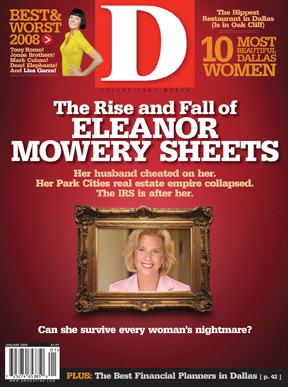 |
| illustration by Phil Foster |
Panicked? I would have to calm down considerably before I could be considered merely panicked. When your net worth has been whacked by more than 40 percent in nine months, and most of that happening in the last six weeks, you’re entitled to a full-blown, flap-your-arms-and-run-around-in-circles-screaming hysteria fit.
Unimaginable damage has been done. That’s plain to everyone. The two big questions that keep us tossing in our beds at night and hitting the bottle early in the day are: will it get worse, and what should I do now?
Let’s all agree on one thing: this is something new and wholly different, and the old rules don’t apply. Diversify? Every asset class except cash has plummeted. Rebalance your portfolio? Why not just rearrange the brown lumps in your cat’s litter box? Look, that stuff is malarkey. I’ve read all manner of advice and predictions for 2009 and beyond, from all the smartest minds in the business. But funny thing, I don’t recall anyone predicting the Dow down 45 percent this year. The only worse year in history was 1931, when the Dow was down 53 percent. If this looming disaster was unknowable less than a year ago, do you really have confidence that future predictions for a better market will be true this time?
And by the way, the Crash of ’29 was no crash at all. The market fell “only” 13 percent on Black Monday, October 28. It was the three years that followed, when the market shed 90 percent of its value, that triggered the Great Depression and the soup lines and jumping out of windows.
So the answer is, yes, it can get worse. The Dow would have to fall another 6,600 points from here to equate to the 1929 through 1932 loss. Yes, it can get worse. Much, much worse.
What should you do now?
RULE NO. 1: KEEP YOUR JOB.
You thought you hated your job? No, you love your job. Have you been reading the papers? You’re lucky to have one. Preserving a steady income is, bar none, the best financial planning you can do. Rededicate yourself to your job. Whistle while you work. Work harder. Please the boss. A $90,000 salary equates to almost $3 million in 10-year Treasury bonds. Don’t lose it.
RULE NO. 2: SELL YOUR STOCKS!
Notwithstanding your best efforts, you might lose your job. And it might take a long stretch to find another one. If you own stocks and bonds outside of your 401(k), sell enough of them (stocks first and then bonds) to raise cash sufficient to fund at least six months worth of living expenses. Preferably eight. If your portfolio is not that big, consider taking your 401(k) to cash. If the market drops further, at least you’re guaranteed that today’s cash will be there. If you have to tap it because you’ve lost your job, you can worry about the tax hit later.
RULE NO. 3: KEEP SELLING!
If you still have stocks outside of your 401(k) after Rule No. 2, and if you have any credit card debt at all, sell more stocks and bonds until you can pay off all of your credit cards. Saving 19 percent in finance charges is like earning 19 percent on an investment. Do you have any investments that are yielding 19 percent right now? Didn’t think so.
RULE NO. 4: SIT ON YOUR WALLET AWHILE.
Do you still own stocks and bonds after Rule Nos. 2 and 3? Congratulations! You’re doing better than most. So here is advice you won’t hear from any financial planner: sell all stocks, mutual funds, and index funds you own. Sell any bond that isn’t a Treasury or triple-A muni. Sit on your cash for a while so that you can get some sleep and clear your head. Yes, you might be selling at the bottom, but what’s the worst that can happen? You miss a big run-up? Do you really expect that? More likely, you’ll miss further losses.
One benefit to selling stocks and bonds today is, you’ll recognize a bunch of capital losses that can offset future capital gains until all the losses are soaked up. Moreover, your losses might be the only appreciating asset you own. If President Obama is successful in raising capital gains tax rates in the future, then your losses will shield more expensive future capital gains (proving even a mushroom cloud has a silver lining).
So when should you start buying back in? Not for at least two years. Oh, there will be bear market rallies where you think that you’ve been left behind, but just be patient. There have been 37 days in the last 80 years in which the market climbed more than 6 percent in a single day. Fully one-third of them occurred between 1929 and 1932, before the market hit its bottom.
Don’t be suckered again. Sit on your hands. Work at your job, spend less, and build cash. When you are up to your eyeballs in cash, pay off your car loans. Pay down your mortgage. If you just can’t stand it, buy triple-A rated munis, which, depending on your tax bracket, are yielding more than 9 percent on a tax-equivalent basis—and currently have almost 20 percent equity-like upside to par. Don’t buy corporate bonds, no matter what the yield or rating. If GM and Citibank can stare into the abyss, then no company is safe.
After two years have passed, when you’re ready to start investing again, buy only low-cost index funds. Unless it’s your full-time job to study stocks, never ever buy individual stocks or mutual funds again. If bona fide geniuses couldn’t beat the market, why do you think you could do better? And never ever again let stocks be more than half your portfolio.
Write to [email protected].





